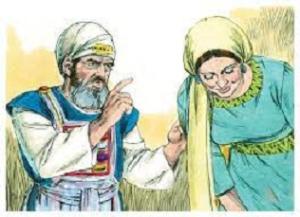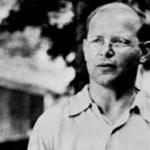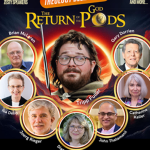The lectionary reading from the Jewish scriptures for today involves one of my favorite Bible characters. Here’s what I have included in my forthcoming book A Year of Faith and Philosophy for this Sunday and this text.
The books of the Bible were written over centuries by men in patriarchal societies; the texts were selected and curated in later centuries by men in patriarchal societies. And yet, women’s voices frequently shine through, as we have seen throughout this book. Sarah, Rahab, Naomi, Ruth, Elizabeth, Mary . . . and in the Proper 28 Year B reading from the Jewish Scriptures, Hannah.
First Samuel begins with a tale that contains many familiar elements from the narratives in the Jewish Scriptures: a powerful and faithful woman surrounded by mansplaining and clueless males who, although in social positions of power, have a lot to learn. Hannah is the favored (and presumably younger) wife of Elkanah, a faithful man of the tribe of Ephraim. Peninnah, Elkanah’s other wife, has several children, while Hannah has no children because “the Lord had closed her womb.” In a typically human move, Peninnah uses Hannah’s barrenness against her; the text reports that Peninnah “used to provoke her severely, to irritate her” to the point that Hannah “wept and would not eat.”
We’ve seen this story before—think, for instance of Sarah’s jealousy when Hagar gives birth to Abraham’s son Ishmael while the son promised Abraham and Sarah has noticeably not shown up. Or of Rachel, the beautiful and favored wife of Jacob, who has no reason to be jealous of her less beautiful, older sister Leah—whom Jacob does not love but had to marry in order to marry Rachel—except that Rachel has no children and Leah has many children.
In Hannah’s case, well-meaning but totally clueless Elkanah doesn’t help the situation when he mansplains to Hannah why, in truth, she has no reason to be sad. He asks, “Hannah, why do you weep? Why do you not eat? Why is your heart sad? Am I not more to you than ten sons?” Using a bit of imagination, I suspect that Hannah’s unrecorded response was along the lines of, “No, dear, as a matter fact you don’t mean more than ten sons to me. In this patriarchal iron age world where a woman’s worth is calculated by how many sons she has, you definitely are not worth even one son, let alone ten. You want to know how to help? Get Peninnah off my back!” Or something like that.
O ne year at Shiloh, the holy place where Elkanah and the family travelled annually to sacrifice and worship, Hannah went off by herself and, “weeping bitterly,” begged God for a son, promising to dedicate that son to God should her prayer be heard and answered. She prayed silently, but her lips were moving. Enter another well-meaning but clueless male. Eli, the priest in charge at Shiloh, concluded that this weeping and mumbling woman was drunk. “How long will you make a spectacle of yourself?” Eli asked. “Put away your wine.”
ne year at Shiloh, the holy place where Elkanah and the family travelled annually to sacrifice and worship, Hannah went off by herself and, “weeping bitterly,” begged God for a son, promising to dedicate that son to God should her prayer be heard and answered. She prayed silently, but her lips were moving. Enter another well-meaning but clueless male. Eli, the priest in charge at Shiloh, concluded that this weeping and mumbling woman was drunk. “How long will you make a spectacle of yourself?” Eli asked. “Put away your wine.”
The Hannah of my imagination, sick to death of male obtuseness and mansplaining, thinks, “Oh for God’s sake, old man, leave me alone! The Lord and I are trying to have a conversation here! Get out of my face!” Showing great self-control instead, Hannah says,
I am a woman deeply troubled; I have drunk neither wine nor strong drink, but I have been pouring out my soul before the Lord. Do not regard your servant as a worthless woman, for I have been speaking out of my great anxiety and vexation all this time.
Eli, to his credit, realizes his mistake and wishes her well—but wisely doesn’t guarantee anything.
We learn subsequently that Hannah does become pregnant, her son Samuel is dedicated to the Lord as she promised (which means that Eli ends up being his father figure and unofficial mentor in things concerning the divine), becoming a major player in the events that move the Jewish people from a loose tribal confederation to a fledgling nation. Samuel, acting as the representative of God in these events, anoints Saul, then David, as the first two kings of Israel.
Hannah gets center stage one last time in the next chapter with “Hannah’s Prayer,” a powerful song of thanksgiving, prophecy, and justice that Mary, the mother of Jesus, clearly had in mind when she sings her similarly powerful Magnificat of thanks centuries later. We would do well to embrace the grace and power of Hannah, this apparently insignificant woman who simply wanted to be treated fairly and to be a mother.
The bows of the mighty are broken, but the feeble gird on strength.
Those who were full have hired themselves out for bread,
but those who were hungry are fat with spoil . . .
The Lord kills and brings to life; he brings down to Sheol and raises up.
The Lord makes poor and makes rich; he brings low, he also exalts.
He raises up the poor from the dust; he lifts the needy from the ash heap,
to make them sit with princes and inherit a seat of honor.
Let it be so.
For reflection: Which of the many women in the Bible have been most meaningful to you in your faith journey? Why?













